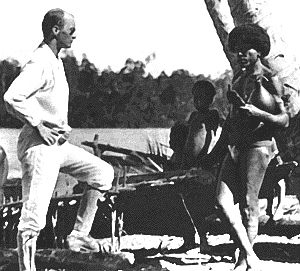 The New Scientist of 18 December 2004 details the kula exchange of the Trobriand Islands, first documented in 1922 by Bronislaw Malinowski, a pioneer in social anthropology (read the whole story here).
The New Scientist of 18 December 2004 details the kula exchange of the Trobriand Islands, first documented in 1922 by Bronislaw Malinowski, a pioneer in social anthropology (read the whole story here).
 This exchange involves a series of islands passing a gift on in a chain. One island starts the process and gives a gift to one of the island – who in turn gives a gift to the next island, and so on until the first island receives a gift from the last island in the chain. Because the chain of giftgiving passes from island to island in a circle, no community receives a present from the one it gives to. And this seems to have huge bonding effects.
This exchange involves a series of islands passing a gift on in a chain. One island starts the process and gives a gift to one of the island – who in turn gives a gift to the next island, and so on until the first island receives a gift from the last island in the chain. Because the chain of giftgiving passes from island to island in a circle, no community receives a present from the one it gives to. And this seems to have huge bonding effects.
Social anthropologists are now trying to bring this type of understanding of ritual and tradition to technologically advanced environments. For example, Vodafone has launched a Postcard service. You send a message to Vodafone and they print it out and send it as a postcard to the person of your choice. The idea is that the recipient will then want to send a postcard of their own, perhaps to a third party, and so draw more subscribers into the network. Microsoft are also employing social anthropologists to help them come up with a replacement for the very annoying paper clip Office Assistant. Social anthropologists have been working on this type of stuff for years. In the 1980s it was a social anthropologist who suggested Xerox that they make the copy button on a photocopier big and green, to help people overcome some of the complexities of the machine.
More and more companies will need to take this type of information seriously in order to link the products to the human beings who are the users and purchasers of their products.


